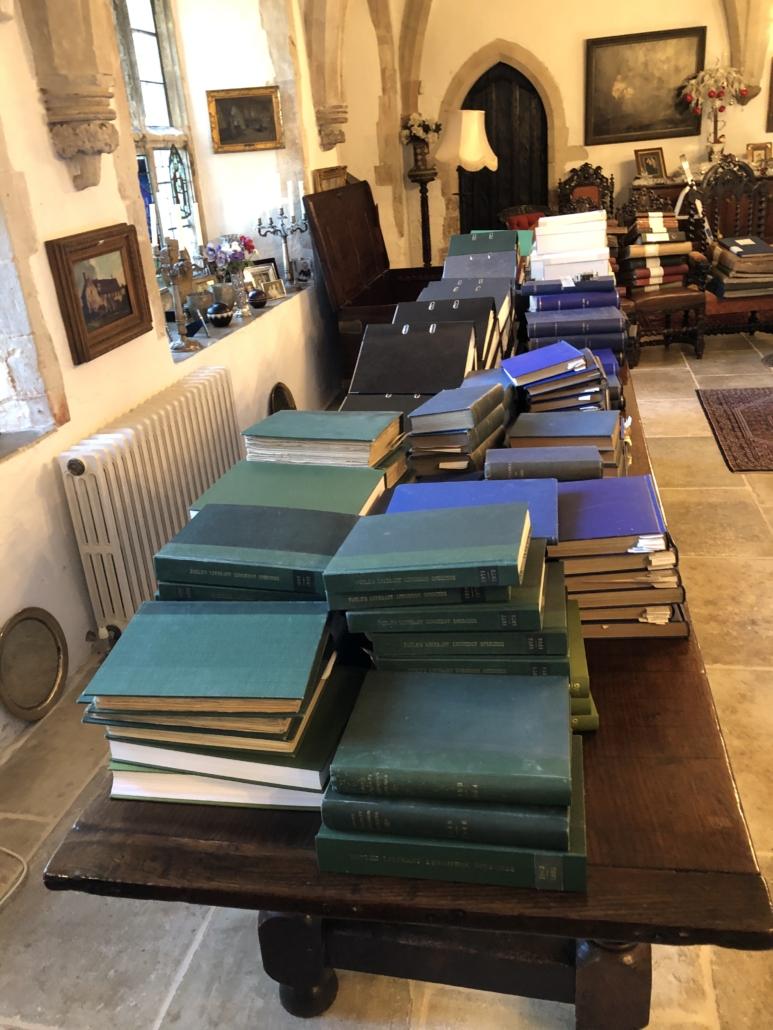The challenge was to work out if the archive could be digitised safely and made available to family members

W&G Foyle Ltd. (Foyles) was a bookseller founded in 1903 which rapidly became a world famous bookstore.
Introduction
Scan Data Experts (SDE) was approached by Christopher Foyle in late 2019 to investigate various options for the protection and accessibility of the Foyles Archive. The private archive was retained by the Foyles family following the sale of the world-famous bookstore business to Waterstones in 2018.
The Challenge
When SDE was first contacted, the archive was stored in a family home. It was sorted but unassessed in terms of condition. Geoff Laycock was contacted by Christopher Foyle to discuss the various options available to the family for protecting the archive for future generations.
The challenge was to work out if the archive could be digitised safely and made available to the family members in some way. The archive was not intended to be made available publicly in its entirety, and the challenge was to digitise the vast range of materials and make them searchable using portable storage media that could be replicated and sent to various family members.
How Scan Data Experts Responded
SDE supported the Foyle family by carrying out a condition report and inventory of the archive, suggesting different options for the preservation and protection of the materials and, eventually designing and delivering a digitisation project to create an entirely digital version of this diverse collection for access by the family.
The first step in the project was to visit the collection and assess it in detail. The collection was well organised in a single room in the family home, and it was possible to assess the collection to come up with accurate page quantities in only 1 day.
There were approximately 100,000 pages of information from 1910 to 2010 when the Foyles archive was held in a digital form only. Almost all the material was types or printed text which would lend itself well to Optical Character Recognition (OCR) thereby making the materials searchable post digitisation.
Much of the material was bound into books and these bindings needed to be protected as part of the digitisation process. The condition was generally good but some of the older materials including press clippings were in volumes where the binding had failed, the paper was brittle due and animal glues had failed leading to clippings coming loose from the pages.
SDE produced an inventory and a condition report recommending that on invasive book scanning be used for the majority of the materials so as to protect the originals while retaining very high quality images for OCR recognition and searchability
SDE also suggested that 300ppi 24-bit RGB colour images be captured of every page side containing content and that it should be stored in as uncompressed TIFF image files as a preservation copy. Utilising a digital preservation solution and online representation of the content was considered but it was decided that the archive should remain private and therefore a local hard drive base methodology should be used to deliver the digital archive to the family.
SDE suggested that the access copy of the archive should be stored as searchable image and text PDF files. These could be gathered together into a PDF ‘Catalog’ or collection enabling users to search across all the PDFs of each file, book or box of index cards. It was also suggested that the PDFs be presented behind PDF forms so that the users could open a single PDF and then prowse or search all the content of the archive from that single jumping off point.
The specification for the project was written and sent to several scanning companies for a competitive tender evaluated with a 70:30 weighting on price. Genus won the tender and secured the project.
The materials were boxed up and collected by Genus and the digitisation was carried out as directed in the specification using their Goobi workflow management system and their specialised book scanners in their facility in Nuneaton.
Geoff Laycock visited the production site several times to spot check the digtisation process and oversee the creation of the data. At the end of the project SDE quality checked all the data before delivery to the Foyle family to ensure that it was correct and that all content has been captured. No issues were found.
The final data (both the high-resolution preservation images and the PDF access copies) were written to several hard drives and delivered to the family members. The original materials were delivered to a secure storage facility.
Why The Foyles Archive Chose Scan Data Experts
Christopher Foyle began the process of investigating digitisation options for the archive in 2019 and had several conversations with universities and potential scanning services suppliers. As part of those conversations SDE was recommended as consultants that could frame his requirements in such a way that scanning suppliers could provide reliable costs for the digitisation of the collection.
After some initial conversations, Mr Foyle asked SDE to provide a quotation for consultancy services. The quotation was to assess the collection condition, generate a detailed inventory and then produce a digitisation specification which could be used to secure scanning quotations from various suppliers. The quotation also extended to managing the selection of the scanning supplier, managing the project and checking the resulting data for accuracy.
SDE was commissioned to work on the project on that basis.





